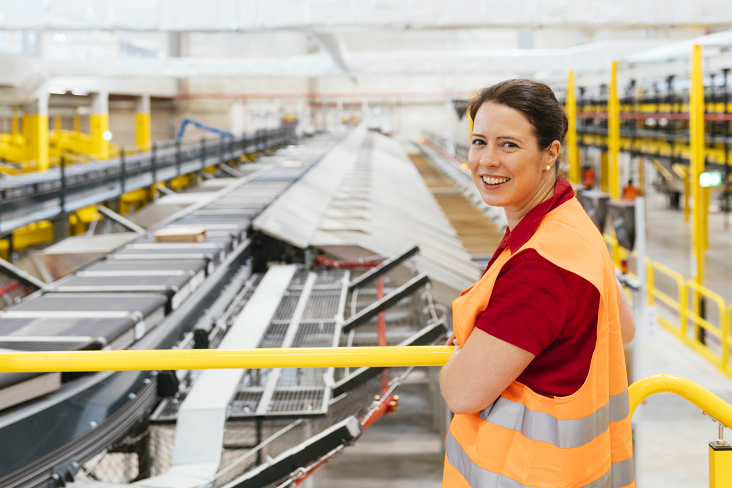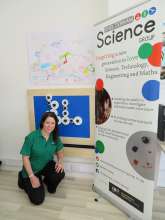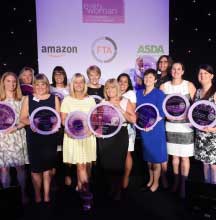“No two days are ever the same”, “the opportunities for progression” and “the chance to leave a real legacy”. Just some of the reasons the women who took part in our 2017 research study told us had drawn them to a career in transport and logistics.
But as dynamic, fast-changing and essential as this industry is, many of those women are aware that their chosen sector has an image problem, and that it’s one that limits the volume of fresh female talent coming through.
There are clear steps an employer can take, however, to address these issues and widely communicate its genuine commitment to women’s entry and advancement. Six months into her first role in T&L, chemical engineer Rachel Cooke reflects on the reasons she was so drawn to her Regional Engineering Manager role with Amazon EU, and what—approaching a year into her tenure—has enabled her to be so successful in what remains a male-dominant sector…
I’d always been good at practical science subjects; my dad was a chemical engineer, and though he tried to not impact my choices too much, he clearly had a huge influence. Growing up in Teesside, I was very aware of chemical plants, and to me they seemed like such exciting places, particularly at night when they were lit up like great big fairgrounds. I wanted to know how they worked and what was going on inside them. I saw that my father enjoyed his job, and, having always been encouraged to play with Lego and trains as much as I was with dolls, it never occurred to me that my gender could be an issue.
Female role models have been hugely important in influencing my career so far. But the best advice I’ve received actually came when I was still in education, and that was to volunteer for things as often as possible. Following that advice built my confidence, helped me learn more about my capabilities, and gave me more to talk about in job interviews. It leads to opportunities too: I volunteered to run an after school science club to introduce young people to engineering, and that led to more and more community work and I was later appointed UK Board Member of the Institution of Chemical Engineers.
While employed in the engineering division of Cadbury, where, for three years, I lived and worked in Poland, I was tasked with designing and trialling a new chocolate bar. It was such a fabulous and rewarding moment when I first saw a member of the public choose and enjoy my product while I was out shopping.
Other roles have literally taken me places I’d never have otherwise visited. I’ve seen Koalas in Australia, flown to Colombia several times, been on Safari in Africa and spent a birthday surrounded by a wonderfully diverse group of conference attendees in Johannesburg, where I was giving a talk on world class manufacturing. All of these experiences were made possible because of my job.
While working for a brewery, where I was researching how the Internet of Things could be used in beer production, I started thinking about the companies really making a difference in the world. I realised the extent to which Amazon is a pioneer in its field, and so when a role came up, I had to go for it.
I was careful to ensure I was choosing an employer with a culture of inclusion. During the recruitment process, I studied the interviewer’s language, how they talked about my achievements and those of women already in the company. I was also aware that Amazon sponsors a category in the FTA everywoman in Transport & Logistics Awards, that they’re very pro women’s networking groups, and that one of their leaders was featured in a list of influential LGBT leaders. All that reinforced my decision to join the company.
Amazon is a very data-driven organisation and it’s clear to me that recruitment and advancement here is down to performance alone. At the same time, it’s important to me that Amazon recognises the need to get more women into the business and ensure they reach the top. We sponsor degrees for women, and do so much internally and out in the community to raise the profile of T&L—it’s really encouraging to see that senior leaders are prepared to invest time as well as money in those kinds of initiatives.
There’s clearly still more to do to achieve gender parity in T&L and the business world in general. At Amazon, I’ve been tasked with building several new teams, and I am still struggling to fill some vacancies, so in that sense I’ve been impacted by the skills shortage. This talent deficit, in my mind, makes the business case for gender diversity so much stronger. It creates opportunities to look at people from different backgrounds and those living with disabilities—as well as women—and invite them into an environment where they can represent so many of our customers and make a difference to their lives.
There’s a huge focus at Amazon on collaboration. The teamwork mentality is helped by the informality of the environment—people don’t dress up, we lunch together and have plenty of breakout areas to meet and chat in. It’s never forced; it’s very much a self-service culture, whereby we’re empowered to seek out mentors, join networks and create affinity groups when we need them.
A good example of this came up just recently. I look after capital planning for Amazon Operations Engineering in Europe and I found myself struggling to find the detail I needed for a report requesting budget for our growth plans. I ended up getting together with two colleagues from different functions. We sat around a screen and in a completely impromptu and unscheduled way, worked together to solve an urgent problem. The experience definitely left me feeling that I’m not on my own; that I’m surrounded by people who are committed to driving business success.
Amazon’s flexible culture really supports diversity too. There’s no presenteeism whatsoever; whether you’re at home, on the road or in the office, working by day or night, it’s about tapping into whatever systems and tools are available to help you get the job done.
I’ve also been given the flexibility and support to continue in my extracurricular role as director of a centre that teaches children about science. Children’s perceptions are fixed at such an early age, so it’s important we do everything we can to inform parents and educators about the huge possibilities that exist for their young people’s futures. I’m having such an amazing, fun-filled career and would hate for others to miss out on similar experiences. The more Amazon uses its influence to showcase the fabulous range of exciting and prestigious jobs available, the better we inform parents, and inspire young girls into STEM subjects and female graduates into related sectors and up through the talent pipeline into positions of influence.









